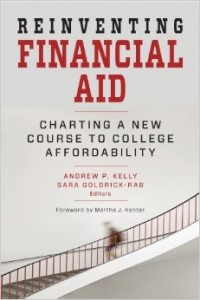Financial Aid in Crisis
 Next time you’re looking to start a conversation with a college student (or college survivor), test-drive this question: “Is college affordable?” If you think the response might unleash a torrent, you’re probably aware of the pandemic of poignant stories of students and families struggling to finance higher education.
Next time you’re looking to start a conversation with a college student (or college survivor), test-drive this question: “Is college affordable?” If you think the response might unleash a torrent, you’re probably aware of the pandemic of poignant stories of students and families struggling to finance higher education.
The crushing need for a financial aid system that actually makes college affordable has driven even the American Enterprise Institute (whose mission flies the flag “Freedom Opportunity Enterprise”) to get involved, hosting a group of researchers, practitioners, and policymakers from a wide spectrum of political perspectives. Among them are sociologist Sara Goldrick-Rab and political scientist Andrew Kelly, co-editors of a new volume called Reinventing Financial Aid: Charting a New Course to College Affordability.
Although Goldrick-Rab and Kelly—and the scholarship they’ve curated—offer quite different tacks for solving the problem of college affordability, they agree that solutions require rigorous analysis of empirical data and the assumptions behind it.
One key takeaway from their combined effort is a compelling argument that the way financial aid is delivered often undermines its ultimate purpose. Many aspects of financial aid policy are treated as normal and unchangeable, particularly the idea that aid—and the burden of paying it back—must go directly to students. Reinventing financial aid, the authors argue, is a crucial step toward ensuring that state and federal government, along with colleges and universities, make college access and completion affordable and equitable.
